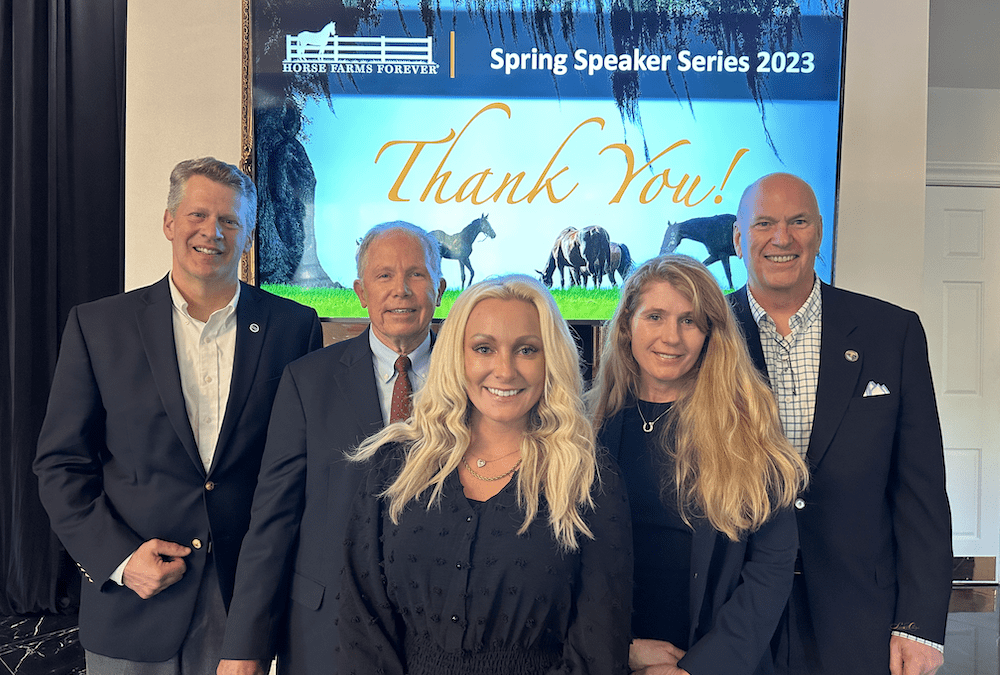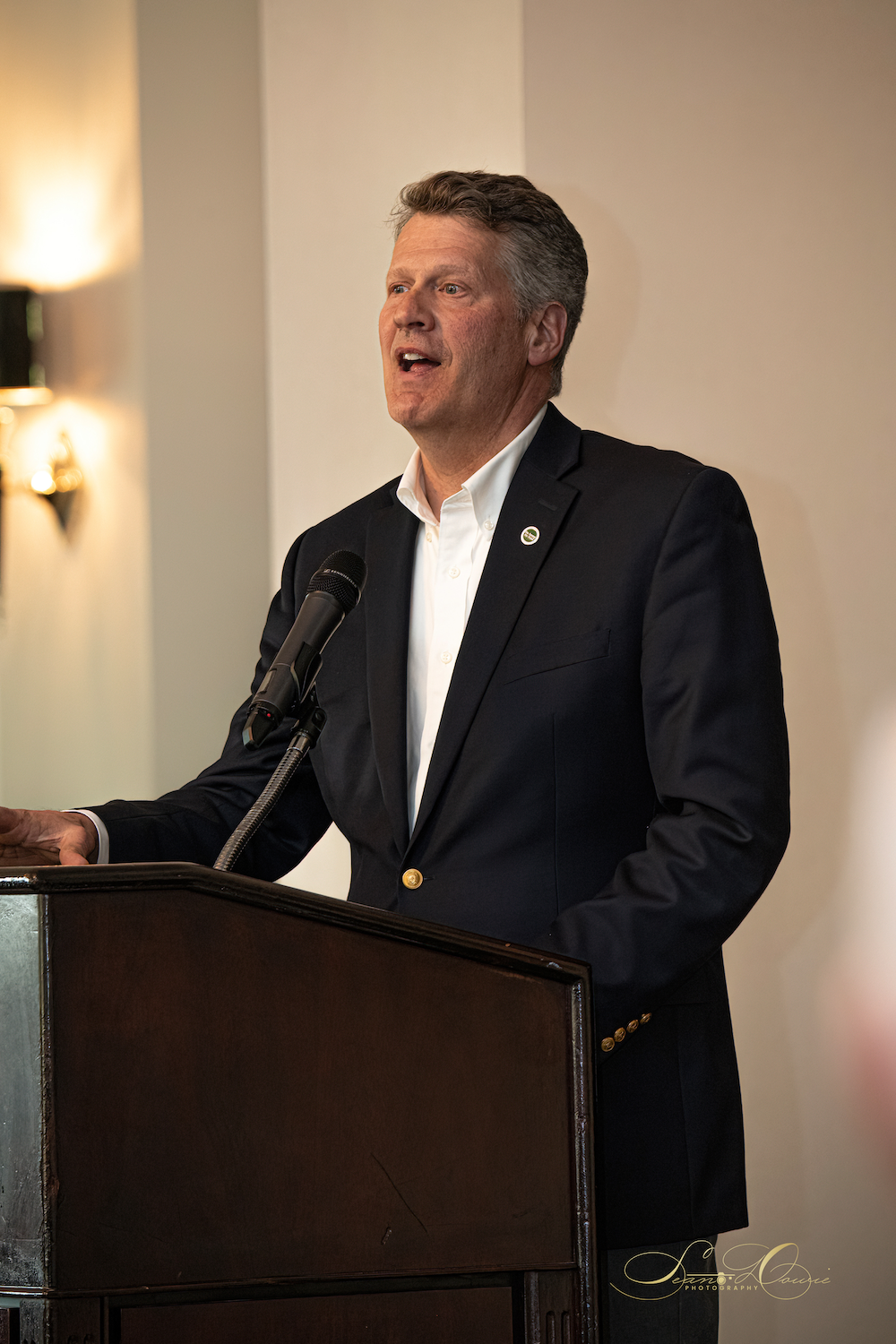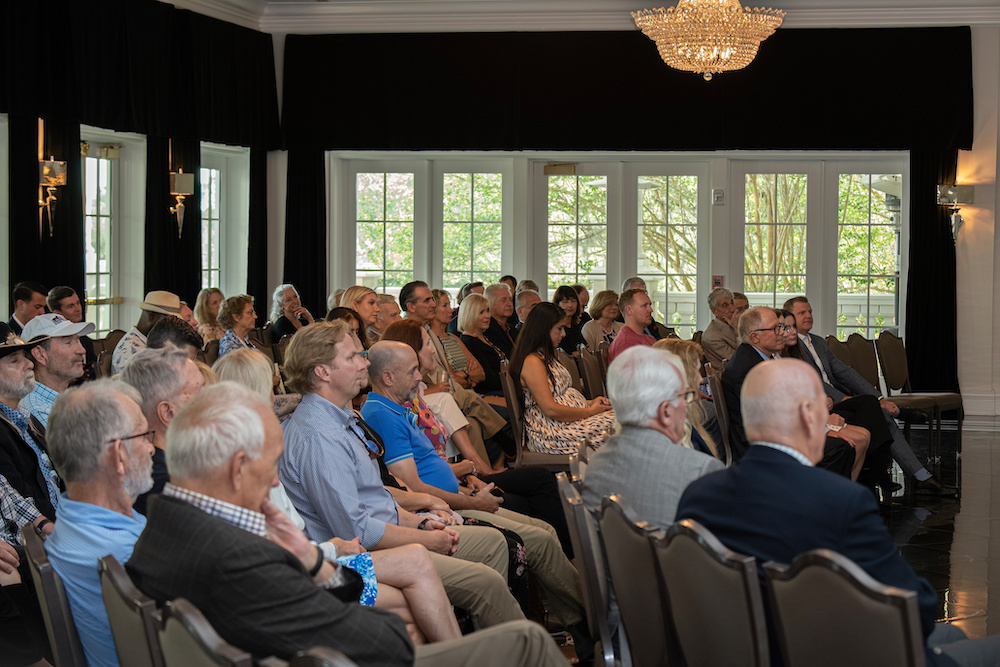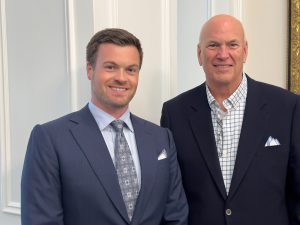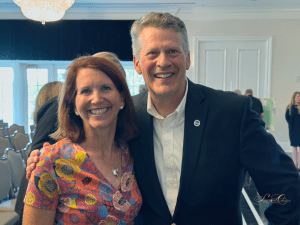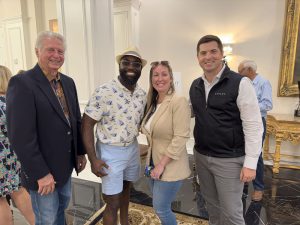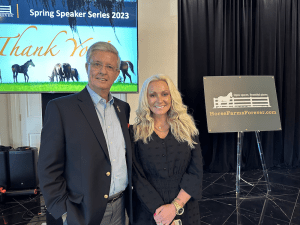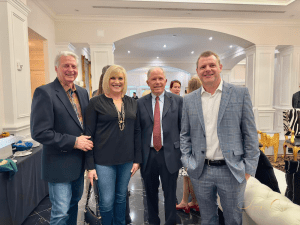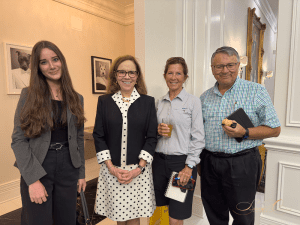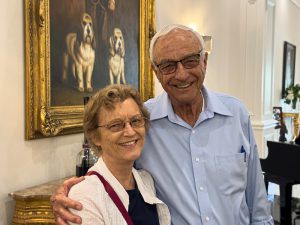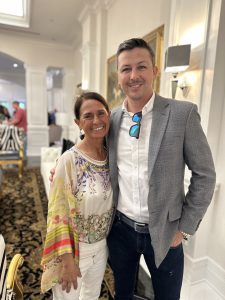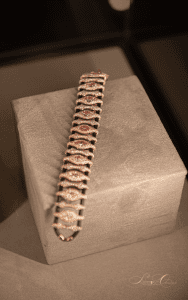John Piotti and Rick Pruetz joined HFF’s Sara Fennessy, Busy Shires and Bernie Little for a conversation about conservation. Photos by Sean Dowie Photography
Spring Speaker Series at Golden Ocala
Over 100 guests joined Horse Farms Forever to celebrate Farmland Preservation Month at our second annual Spring Speaker Series event on Friday, April 14th at Golden Ocala Golf & Equestrian Club. Our Presenting Sponsor for the event was Lugano Diamonds and our Program Sponsor was Merrill Lynch Wealth Management. Many thanks to them for their gracious support!
We were honored to have two of the nation’s leaders in farmland preservation as our speakers. John Piotti is the President and CEO of the American Farmland Trust (AFT) and Rick Pruetz of Smart Preservation, who is an FAICP professional planner and a nationally recognized expert on Transfer of Development Rights.
American Farmland Trust’s John Piotti.
Saving America’s Farmland
John spoke about the importance of preserving farmland and highlighted AFT’s role as the only agricultural land trust with a national scope. AFT has preserved over 7 million acres of farmland since the organization’s founding in 1980 by Peggy Rockefeller. AFT pioneered the use of conservation easements to protect farmland from development, and also works to develop programs at the federal, state, and local level to purchase conservation easements. Under John’s leadership, AFT has helped secure billions of dollars in federal funding to protect farmland and has developed several new programs to support climate-smart agriculture, regenerative farming practices, and next-generation farmers.
“Yet despite these accomplishments, AFT and its partners have much more work to do because, every year 750,000 acres of productive farmland is lost to development,” said John.
Research conducted by AFT shows that over the next 20 years, given current growth trends, Florida will lose over 620,000 acres of land, which translates into losing about 4,400 farms, $727 million in farm output, and 21,400 jobs. Even in Marion County, over 2,500 acres has been lost from the Farmland Preservation Area. While these numbers are staggering, the tools exist to help slow this trend. AFT partners with other state and local organizations to raise awareness about farmland preservation and the tools, including conservation easements, available to landowners to protect their farm, explained John.
John also emphasized the importance of local comprehensive planning to help protect farmland. AFT’s research also shows that with better planning and development choices, that over 350,000 acres of farmland, 2,500 farms, $347 million in farm output, and 11,000 jobs can be saved in Florida. In addition, with better planning, local governments can more effectively reduce the cost of community services such as roads and emergency services.
“While conservation easements are great tools to preserve farmland, they can only protect so much land,” said John “With a good comprehensive plan, more land can be preserved on a larger scale.”
One of the tools in Marion County’s comprehensive plan to help protect farmlands and steer growth to urban areas is the existing Transfer of Development Rights (TDR) program.
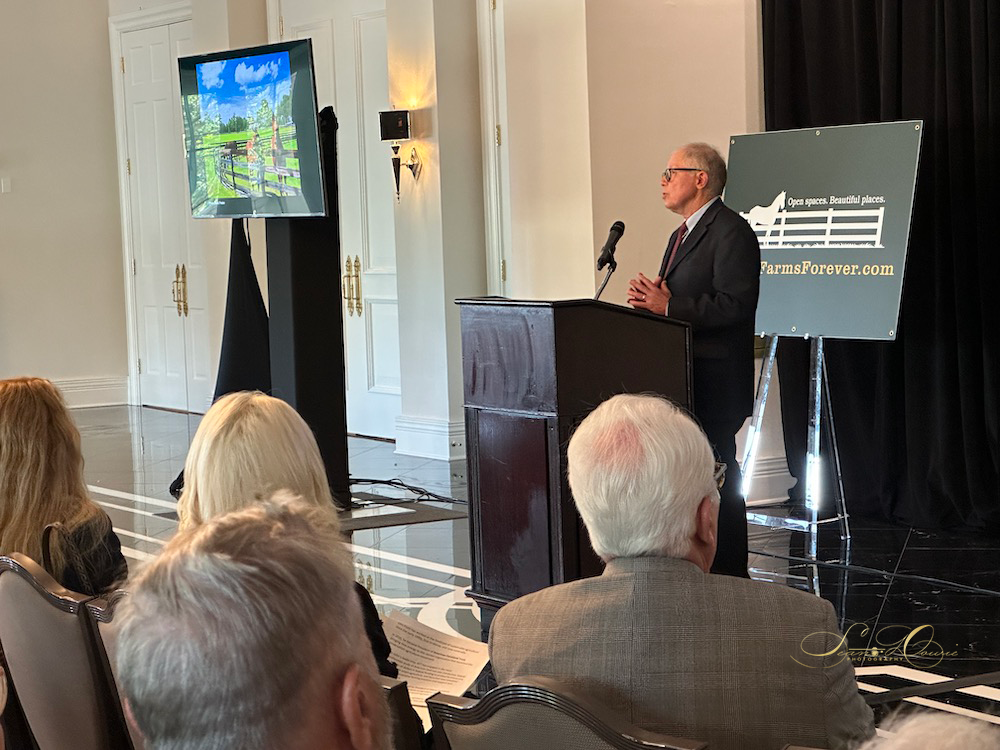
Rick Pruetz is a city planner, author, consultant and national expert on the subject of Transfer of Development Rights programs.
How TDRs Can Help Save Farmland
Also, during the evening, Rick Pruetz presented insights on successful TDR programs in other communities. He also provided some suggestions to help improve Marion County’s TDR program.
Rick explained the basics of how TDR programs work. TDRs are a voluntary program that allows the owner of one property (Sending site) to transfer the development rights to the owner of a second property (Receiving site). The Sending site owner receives money from the sale of the development rights to the Receiving site owner. Then, those development rights are transferred to the Receiving site property to increase the density.
TDR programs can benefit landowners, developers, and communities by helping them implement their preservation as well as development goals without reliance on taxation. Instead, TDR uses market forces to transfer the density from one property to preserve natural resources, wildlife habitat or farmland, to another property in a designated urban area, explained Rick.
“One of the most successful TDR programs was created in Montgomery County, Maryland,” said Rick. “Montgomery County is located just north of Washington, DC, but despite tremendous development pressure, the County has preserved over 72,000 acres, with 52,000 acres through a TDR program.”
Montgomery County’s TDR program not only preserved the land, it also helped preserve the agricultural economy and created more investment by farmers in their business.
“Preserving the land also gave landowners greater confidence that farming would remain a viable activity,” said Rick. “It stabilized the agricultural industry and prevented landowners from selling their land out of fear that the farm next door would be developed.”
In 2022, HFF hired Rick to evaluate Marion County’s TDR program to determine why the program is underutilized. Rick compiled his research into a Preliminary Study, which evaluated Marion County’s TDR program against Ten Success Factors.
“Marion County excels in one of the top ten success factors for TDRs, which is strong support for preservation from the community,” said Rick. “For example, in 2005, the Farmland Preservation Area was created, and in 2021, over 90% of respondents agreed that the Farmland Preservation Area should be maintained to ensure Marion County’s legacy of the Horse Capital of the World for future generations.”
Marion County’s TDR Program
Marion County’s TDR program was created in 2004. The TDR Receiving Area was designated as the Urban Growth Area and the Sending Area was named the Farmland Preservation Area in 2005. In 2007, the Sending Area was expanded to include all land designated as Rural Lands outside of the Urban Growth Area that are 30 acres or more and accepted by the County as having significant resources. About 3,200 acres has been preserved with conservation easements through the TDR program.
Rick also made some suggestions on how to improve Marion County’s TDR program by focusing on four success factors that could help increase the viability and effectiveness of the TDR program by creating more demand for TDRs.
HFF will be hosting additional meetings with stakeholders to discuss the four success factors and to determine if the Marion County Commission will adopt any of the recommended changes, but the process of updating the TDR program was off to a great start.
“It warmed my heart to see a room of thoughtful people interested in hearing positive approaches to farmland preservation and agricultural policy,” said Rick after the event.
The Spring Speaker Series event is a continuation of Horse Farms Forever’s successful Conversations about Conservation program. One of HFF’s goals for this year’s program was to highlight just how fragile the boundaries of the Farmland Preservation Area (FPA) are in Marion County. Even though this area has been designated as a preservation area, the boundaries of the FPA can be erased by a vote of just three of the five Marion County Commissioners.
These conversations between land conservation experts and landowners are often the first step in preserving horse farms for future generations.
Join our efforts to preserve what we all love about Marion County – the horses, open spaces and beautiful places.
Thank You To Our Sponsors!
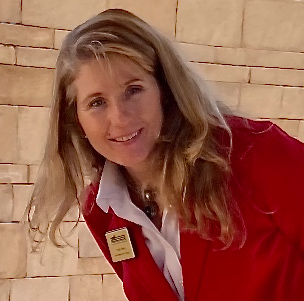
What About Zoning?
The Zoning regulations are found in the Land Development Code, which is a separate document with specific guidelines to implement the Goals, Objectives, and Policies of the Comprehensive Plan.
Zoning regulates development through land use classifications and specifies the areas in which residential, industrial, recreational or commercial activities may take place. The Land Development Code was adopted through a series of ordinances by the County Commission, which means that the regulations cannot be changed or waived, except by a further vote of the County Commission.
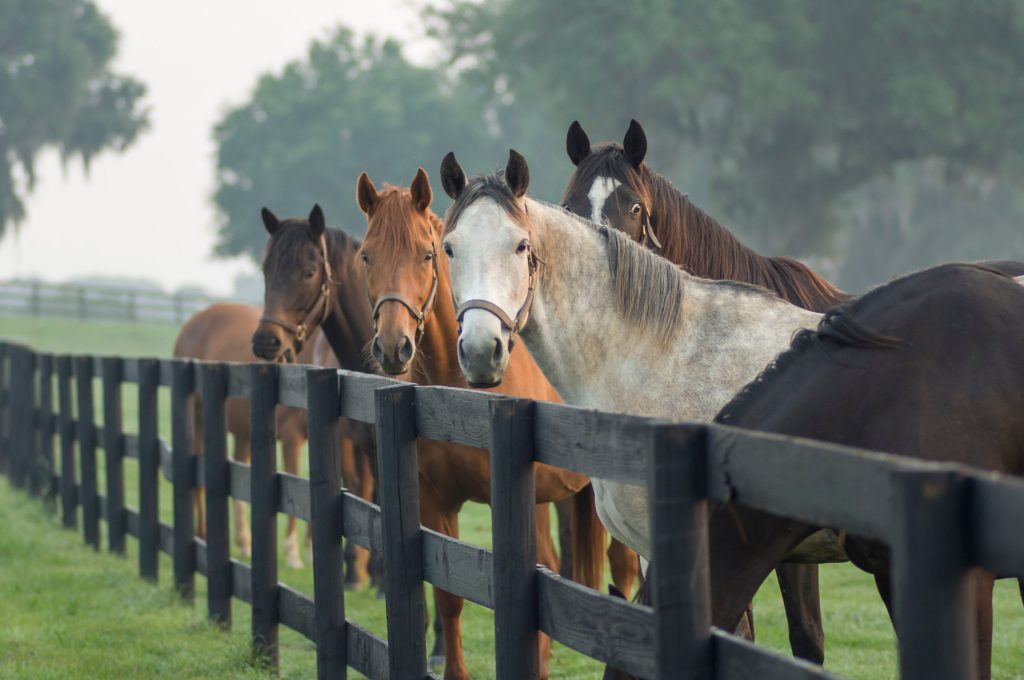
It is the vision and mission of Horse Farms Forever to inspire conservation of horse farms through education, awareness and idea exchange so as to preserve natural pasture land focusing on horses and their habitats, to protect soil and water on which they depend, and minimize land use conflicts
in Marion County, Florida.
We are watchful of government and others to preserve and protect horse farms and farmland for future generations - especially in the Farmland Preservation Area. We are neither anti-growth nor anti-development; we encourage urban growth to remain inside the Urban Growth Boundary.
Horse Farms Forever® is a Florida not-for-profit corporation registered with the Florida Department of Agriculture and Consumer Services as a charitable organization and approved as a tax-exempt 501(c)(3) corporation by the Internal Revenue Service. Horse Farms Forever® does not have a political mission. Our status as a 501(c)(3) charitable organization does not allow us to participate or intervene in political activities. The organization will neither advocate on behalf of political candidates nor advocate for the passage of legislation.

